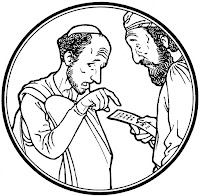CLICK HERE for the audio file.
CLICK HERE for the video file.
Blessed to See and Hear
Grace to you and peace from God our Father, and from our Lord and Savior Jesus Christ. Amen.
Why do some believe, while others don’t? Why are some saved, and the others aren’t? How is it that one person receives the Word in faith, while another rejects that same Word? The answer to these questions is a simple one, though it is not entirely satisfying. If we reject God’s Word, it is our own fault; we cannot lay that burden at any door but our own. And if we do believe God’s Word, if we do have the faith in Jesus Christ, it is due solely and completely to the grace of God. And even the very faith itself that holds to the promises of God’s Word is a gift of grace, worked in us by the Holy Spirit through the Gospel in Word and Sacrament. Whether or not this answer satisfies anyone’s curiosity, this is the answer.
“Blessed are the eyes that see what you see! For I tell you that many prophets and kings desired to see what you see, and did not see it, and to hear what you hear, and did not hear it.” Our salvation consists of seeing and hearing Christ. These disciples, of course, were uniquely blessed in that their seeing and hearing was physical. They saw Jesus for themselves; they could touch Him and know that He was flesh and blood, just like them. Prophets and kings, men of God who had come before, had longed to see and hear what the disciples beheld. And the faith of those patriarchs was no less true; they had just not had the blessing of seeing its fulfillment in Christ.
But there were also those who saw and heard Jesus for whom there was no blessing. There is nothing clearer in the Gospels than the truth that Jesus had proclaimed the coming of the Kingdom for all to see and hear in Him. St. John said: “He came to His own, and His own people did not receive Him.” Only faith receives such blessings, and that faith is God’s gift.
Your seeing and hearing is not physical, but nothing is taken from your salvation because of that. You are like those prophets and kings in one sense; your seeing and hearing is not physical, but spiritual. On the other hand, you have God’s complete revelation in Holy Scripture; you know everything that took place for your salvation. As Jesus said to Thomas: “Blessed are those who have not seen, and yet have believed.”
The salvation we see and hear is what is shown to us in this parable of the Good Samaritan. We see that man who fell among robbers, who was stripped and beaten and left for dead—and we know that we are that man. That is what sin and Satan do to us. We have no natural defense against them. And Jesus is that Good Samaritan who does not pass us by in our need. Jesus is pure compassion. He binds up our wounds. He carries us with His own strength to this place of refreshment where we receive proper care. He will pay whatever is necessary to make us whole again. Is this not what takes place at the cross? There Jesus, like the Samaritan, was despised and rejected of men. Those without eyes to see and ears to hear the truth saw only a man who was receiving a punishment he seemingly deserved. But with eyes to see and ears to hear, we see the redemption of this world, and we hear the words of a compassion that can only be divine: “Father, forgive them, for they know not what they do.”
This was what generations of prophets and kings had longed to see and hear. It is what you and I have been given to see and hear. And the place of this seeing and hearing is the Church, which is also why many do not see and hear these things. Jesus is the Good Samaritan; the inn is the Church. As Luther tells us, “Here we have the substance of the Gospel. The kingdom of Christ is a kingdom of mercy and grace in which there is nothing but a continual carrying of the lost. Christ takes our sins upon Himself and has patience when we fail. We still always lay around His neck, and yet He does not become weary of carrying us, which should be the greatest comfort for us when we are in conflict with sin.”
And that brings us back to the question with which we began: “Why are some saved and not others?” Why you or me, and not someone else? The answer is the grace of God, and because that is the answer, we cannot really ask why. God knows why, and that is enough. After all, “Who has known the mind of the Lord?” Grace is the exclusive work of God. And that grace is also promise: once the Lord has you, He will not let you go. That is why you are blessed in your seeing and your hearing. That is why you have eyes to see and ears to hear. That is why you humbly, faithfully, come to receive the true body and blood of Christ, where you see His body broken in death, but now raised to life; you see His blood shed for sin, ever pleading for you before the throne of heavenly grace. And you are blessed in your seeing and your hearing, even unto life that is everlasting. In the name of the Father and of the Son (†) and of the Holy Spirit. Amen.
The peace of God which passes all understanding will keep your hearts and minds in Christ Jesus always. Amen.












